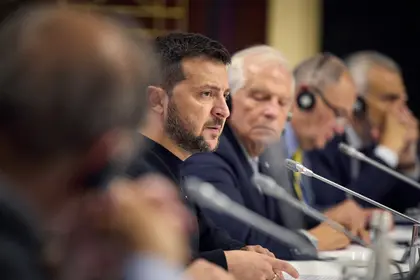A report card from the European Commission on how well Kyiv is coming along in fulfilling EU requirements to start membership talks will likely arrive very soon.
As Kyiv Post reported on Sept. 21 – since June, Ukraine’s taken many steps to follow the EU’s instructions – and though it will be revealed for sure only when its written report is received – Kyiv has likely already done enough to kickstart membership negotiations.
JOIN US ON TELEGRAM
Follow our coverage of the war on the @Kyivpost_official.
“We think they will be positive,” Deputy Speaker of the Parliament Oleksandr Kornienko reiterated in a call with Kyiv Post on Thursday, Oct. 5.
If everything goes well, Kornienko predicts negotiations on Ukraine's EU membership will begin no later than January. Others have predicted as soon as December.
That said, membership talks themselves will likely take years – in the past, Kornienko’s said that he believes Ukraine could actually become a member by 2029 – but entering talks with the EU will already transform the relationship between Kyiv and the EU from something more top-down to something more cooperative, Ambassador of the EU to Ukraine Matti Maasiikas told European Truth in a Sept. 7 interview.
And as European Parliament President Roberta Metsola told British media, the EU could already begin taking concrete steps to more closely integrate Ukraine into the EU – including by removing trade tariffs, giving Ukrainians more access to European markets, opening access to European universities, and removing mobile phone roaming costs.

Euromaidan Revolution: How It Happened. The Story of a Participant
“If they (Ukrainians) are going fast, we should match that speed,” Metsola told The Guardian in an article published Sept. 26.
In early October, representatives of the European Commission led by High Commissioner for Foreign Affairs and Security Policy Josep Borrell came to Kyiv and met with Ukrainian parliamentarians to discuss Kyiv’s progress in implementing EU recommendations for seven areas of reform.
In an interim report in June, the European Commission had found that Kyiv had met two of its requirements – in the areas of judicial governance and media legislation – but that there was still work to be done in some other areas, like anti-corruption legislation and law pertaining to the treatment of national minorities.
Kornienko said that Ukraine’s European partners still have questions regarding its fight against money laundering and that they’re still waiting for Kyiv to adopt a law it passed on Sept. 20 – one requiring that officials that could be vulnerable to bribes publicly declare their assets.
As for legislation related to the rights of national minorities, although the parliament, the Verkhovna Rada, supported what it believed to be the necessary amendments on Sept. 21, Kornienko said that Kyiv still awaits the conclusions of the EU’s Venice Commission.
You can also highlight the text and press Ctrl + Enter






